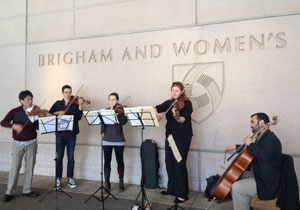President Woodcock's Statement on Marathon Bombings
The Conservatory meets violence with the consolation of music
 All over the world, people have been shocked and disturbed by Monday’s bombings at the Boston Marathon. Because we are situated so close to Copley Square and the finish line, we at NEC were witness to the profoundly troubling chaos and horror of this event.
All over the world, people have been shocked and disturbed by Monday’s bombings at the Boston Marathon. Because we are situated so close to Copley Square and the finish line, we at NEC were witness to the profoundly troubling chaos and horror of this event.
I’m relieved to say that the NEC family is safe and accounted for. And I am deeply grateful to our security staff which sprang into action Monday and took all precautions to keep our students, faculty, staff and concert-going public safe. They did a thorough sweep of our buildings and grounds before closing the classroom/performance facilities for the evening. Then, they continued to monitor the campus overnight. Similarly, our Student Life staff encouraged all the students living in our residence hall to stay in place and organized activities for them throughout the evening. We also offered counseling support to anyone who requested it.
On Tuesday, we made the decision to stay open and resume all classes, rehearsals and performances. We believe that the best antidote to a terrorist act is to pursue our normal lives—as long as security is strong. Indeed, we are emulating Leonard Bernstein’s much quoted maxim:
This will be our reply to violence:
to make music more intensely,
more beautifully,more devotedly than ever before.
To this end, the NEC Wind Ensemble and Symphonic Winds presented a terrific concert on Tuesday night dedicated to two recently deceased NEC alumni and the victims of the bombings. In a particularly enterprising, even heroic, act, cellist Emileigh Vandiver, gathered a group of fellow musicians and talked her way into one of the area hospitals. There, they offered comfort to patients, health care workers, security, hospital staff, families, and custodians. (See her photo above.)
In his program note for the Wind Ensemble concert, conductor Charles Peltz wrote movingly of our response to tragedies:
John Donne is right about people and islands, to lose a person is a unique personal diminishment suffered by all. To lose a number of innocent beings because of senseless violence is more than that, as the violence carries with it the attacker’s message – “my voice will be heard by silencing the voices of others.” After the roar of the blast comes the silence of disbelief. And then? Music. Tonight we play because these voices onstage, the voices of the young and talented, passionate and thoughtful will not – cannot - be silenced.
That, I think, summarizes our responsibility as musicians during tumultuous times. We cannot remain silent but must speak our outrage, grief, and consolation with the most eloquent of arts--music.
Tony Woodcock, President
About the photo: Cellist Emileigh Vandiver '10, '12 M.M., '13 G.D. took a break from playing for patients, health care workers, security, hospital staff, families, and custodians at Brigham and Women's Hospital in Boston, in order to photograph the fellow musicians who had joined her in this mission to provide comfort. Seen here are violinists Ethan Wood '06, '08 M.M., '09 G.D.; Sean Larkin (Boston University student), and Perry Tal '12 M.M.; violist Dr. Michelle Rahn (Boston University graduate), and cellist Sassan Haghighi (Prague Conservatory graduate).
